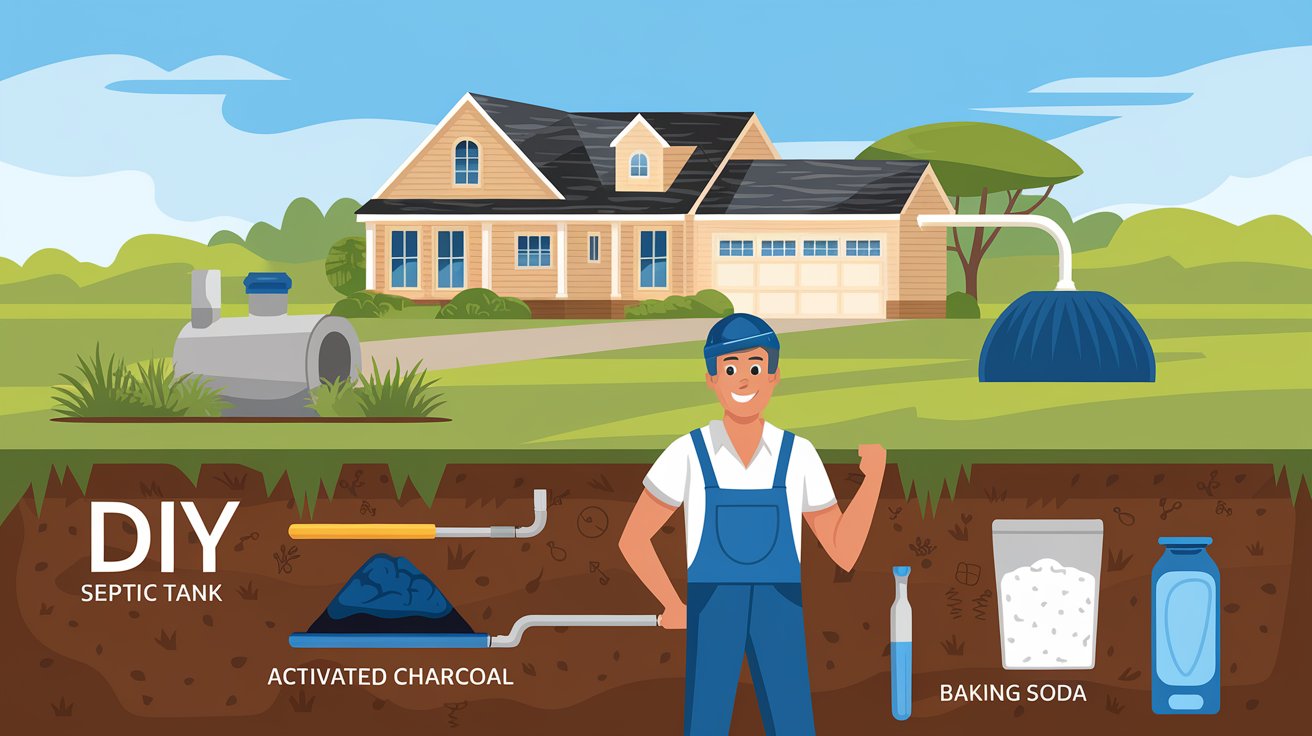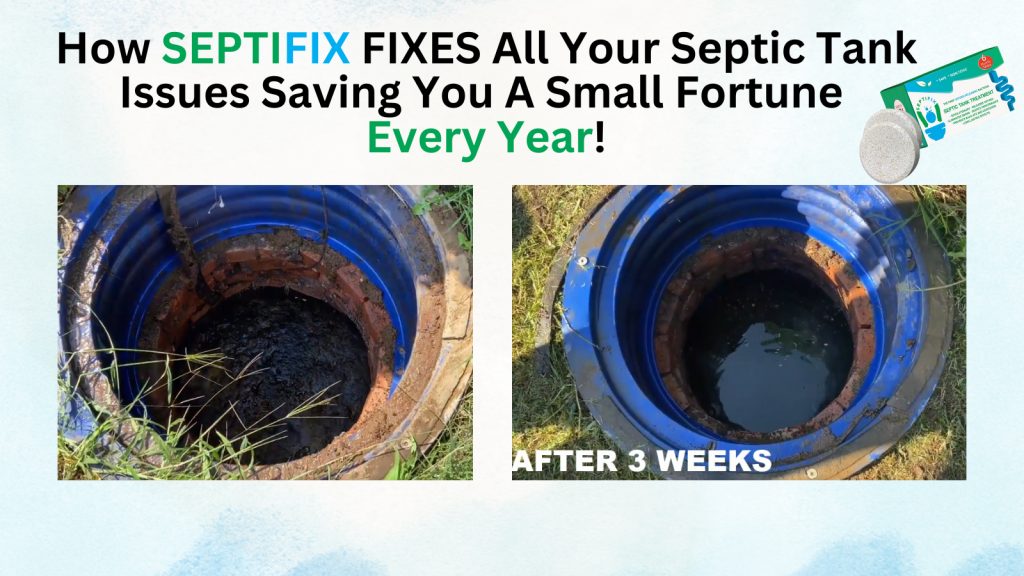Septic smells are more than just unpleasant—they can signal underlying problems in your system. If you’re searching for DIY fixes for septic tank odors, you’re not alone. Many homeowners face this issue, especially in rural areas or properties using alternative wastewater systems. Understanding the cause of these odors and how to fix them can help you avoid costly repairs and restore comfort to your home.
Table of Content
- What Causes Septic Tank Odors?
- DIY Fixes for Septic Tank Odors
- When DIY Isn’t Enough: Call a Professional
- Preventive Tips for Long-Term Odor Control
- FAQs on DIY Fixes for Septic Tank Odors
- Septic Permit Links by State
What Causes Septic Tank Odors?
Common Sources of Smelly Problems
Septic odors often result from gases like hydrogen sulfide and methane, which are byproducts of waste breakdown. While the tank is supposed to contain these gases, problems arise when:
- Vents become blocked or broken
- The tank is too full
- Plumbing traps dry out
- Improper materials are flushed
- Bacteria levels are imbalanced
These issues can affect not just the tank itself but also the drain field and indoor plumbing, resulting in bad smells inside and outside your home.
DIY Fixes for Septic Tank Odors
1. Check and Clean Plumbing Vents
Your home’s plumbing vents allow gases to escape above the roofline. A clogged vent pipe—due to leaves, bird nests, or ice—can force gases back into your home. Here’s what to do:
- Use a flashlight to inspect the rooftop vent.
- Carefully remove any debris.
- Pour a small amount of water to test for blockage.
- Call a plumber if you’re uncomfortable with heights.
Pro Tip: Installing a charcoal filter on the vent can also help absorb odors.
2. Flush Drains to Refill Dry P-Traps
If you smell septic odors indoors, especially near infrequently used sinks or floor drains, a dry P-trap may be the cause.
- Pour a quart of water down each drain monthly.
- Add a tablespoon of mineral oil to slow evaporation.
This simple fix can stop gases from entering your living space.
3. Use Septic-Safe Enzyme Treatments
Bacteria imbalances can lead to odor problems. Introducing enzyme-based septic treatments helps restore the natural microbial balance.
- Look for products labeled “septic-safe.”
- Use as directed—usually monthly.
- Avoid chemical cleaners that harm beneficial bacteria.
Trusted Source: EPA Septic System Care Guide
4. Inspect the Drain Field
If the odor is strongest outdoors, your drain field may be saturated or malfunctioning.
- Walk the area for signs of pooling water or lush, green patches.
- Avoid planting deep-rooted trees nearby.
- Divert surface water away from the field.
If drainage seems poor, consider having a professional evaluate the system to prevent long-term damage.
5. Pump the Tank Regularly
Sometimes, the simplest solution is the most effective. If your tank is overdue for pumping, accumulated sludge can lead to odors and backups.
- Most tanks need pumping every 3–5 years.
- Schedule service with a licensed professional.
Warning: Never attempt to open or enter a septic tank yourself—dangerous gases can cause serious harm.
When DIY Isn’t Enough: Call a Professional
Some situations go beyond the scope of DIY:
- Persistent indoor odors
- Backups or gurgling sounds
- Slow drains despite treatment
- Overflowing drain fields
In these cases, contacting a certified septic professional is the safest option.
Preventive Tips for Long-Term Odor Control
Maintain a Healthy System
- Use septic-safe toilet paper
- Avoid flushing wipes, grease, or chemicals
- Conserve water to prevent overload
- Install a riser for easier tank access
These practices can help you avoid emergency repairs and extend your system’s lifespan.
Conclusion
A smelly septic tank doesn’t always mean disaster. With a few DIY fixes for septic tank odors, you can often resolve the issue yourself. From cleaning vent stacks to adding enzyme treatments, small steps make a big difference. Still, know your limits—some jobs require a pro.
Take action today to keep your home fresh and your septic system running smoothly. If you’re ever unsure, don’t hesitate to consult a local expert.
FAQs on DIY Fixes for Septic Tank Odors
Can using septic-safe cleaning products prevent odors?
Yes, using septic-safe cleaning products helps maintain the health of your septic system by preserving the beneficial bacteria that break down waste. Avoid using harsh chemicals, such as paint thinners or cleaning solvents, as they can harm these bacteria and cause odor problems. Septic Tank Servicing.
What are the common causes of septic tank odors?
Septic tank odors typically arise from issues such as poor maintenance, excessive solids buildup, blockages in pipes, and drainfield problems. Household habits like flushing non-biodegradable items or using harsh chemicals can also disrupt the natural bacterial balance, resulting in unpleasant smells. Septic Tank Guy
How can natural remedies help control septic tank odors?
Natural solutions like baking soda, vinegar, and essential oils are effective DIY remedies. Baking soda absorbs odors, while vinegar neutralizes bacteria and odor-causing compounds. Essential oils such as tea tree or lavender add a pleasant scent and have antimicrobial properties. Septic Tank Servicing
How often should I pump my septic tank to prevent odors?
Routine septic tank pumping is essential to maintain a functioning system and prevent odors. The recommended frequency varies depending on household size and water usage but generally ranges from every 1 to 3 years. Regular professional inspections also help ensure everything is functioning as it should.
What steps should I take if odors come from the drainfield?
Odors from the drainfield could be due to soil saturation, poor drainage, or faulty design. Preventive measures include landscaping adjustments to improve water runoff, regular inspections for signs of damage, and consulting with a septic professional if issues persist.
Septic Tanks in Rural Areas: A Practical Guide for Homeowners
Directory | Wyoming Septic Service Providers : Best Professionals
Directory | Wisconsin Septic Service Providers | Part 3
Directory | Wisconsin Septic Service Providers | Part 2
Directory | Wisconsin Septic Service Providers | Part 1
Directory | West Virginia Septic Service Providers : Best Professionals
Winter Pumping: Should You or Shouldn’t You?









